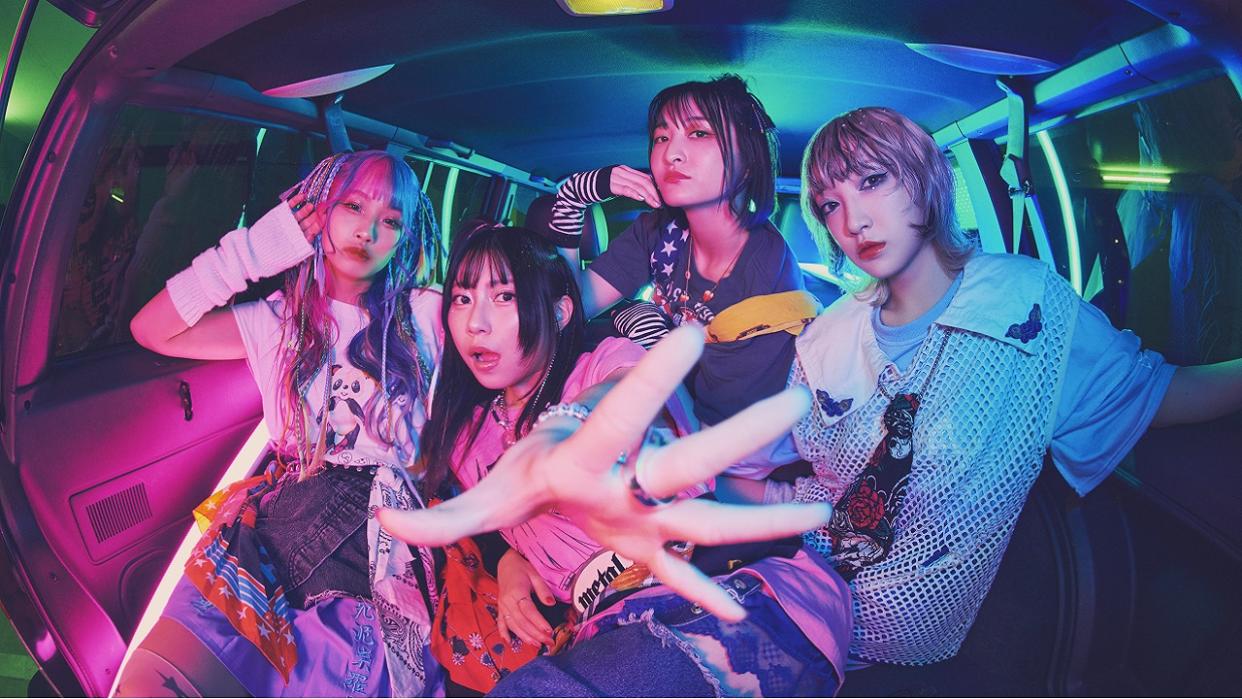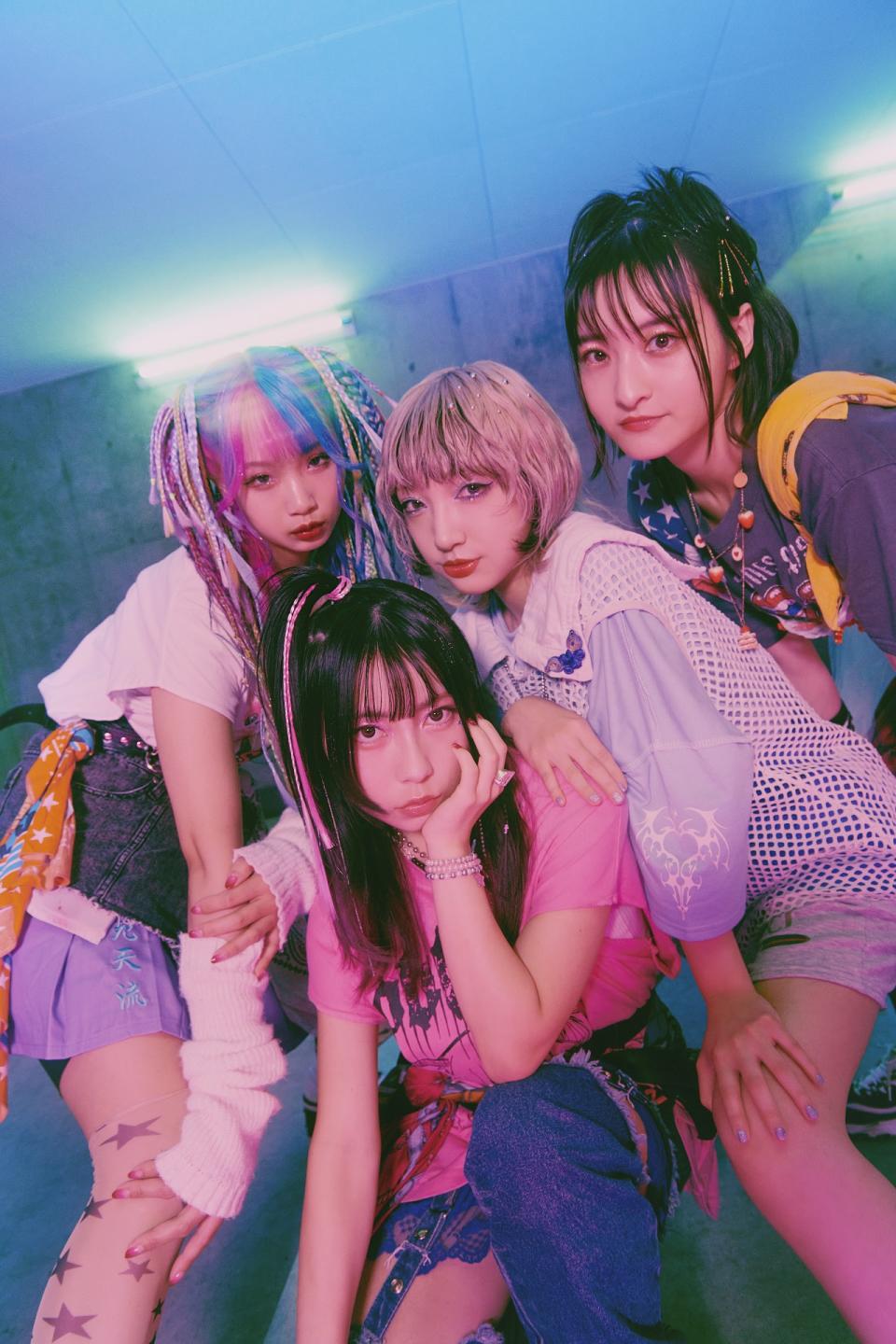"We want to put out positive messages even when the music is its most brutal." Rising Japanese metal stars Hanabie have their sights set on world domination

Viewed from above, the famous pedestrian crossing outside Tokyo’s Shibuya Station resembles the world’s largest and best-organised wall of death. Stand at its centre point as thousands of Tokyo residents and wide-eyed tourists hurtle across the intersection from every conceivable angle, and you will experience true sensory overload.
The blur of human traffic is accompanied by a dizzying, truly deafening collage of sounds. The relentless metallic clinking from the district’s Pachinko arcades clashes against the effervescent beats of the latest J-pop and K-pop hits bleeding across from the SHIBUYA109 mall, the world’s wildest, loudest department store.
Advertising jingles blare out from the giant neon screens overhead, and loudhailer-wielding street vendors yell enthusiastic exhortations to embrace the joys of consumerism. It’s a jarring, disorientating, almost overwhelming experience, yet also exhilarating, intoxicating and weirdly life-affirming.
This rush of sensations mirrors the emotions stirred while listening to the city’s latest breakout band Hanabie, whose joyously chaotic, thrillingly intense, hyper-kinetic second album, Reborn Superstar!, released in the summer of 2023, was heralded in Hammer as signifying “the arrival of Japan’s next great crossover metal stars”.
Such predictions do not faze Hanabie at all. In a recent interview, when asked what the future holds for her band, vocalist Yukina was even bolder, stating, “I want to become the world’s number one girl band.” We’re not accustomed to hearing Japanese bands express such naked ambition, but Hanabie have zero interest in conforming to stereotypes.
This was made abundantly clear 12 months ago with the eye-catching video for (Pardon Me, I Have To Go Now), which saw the quartet - high school friends Yukina, Matsuri (guitar/vocals) and Hettsu (bass), plus 2023 recruit Chika (drums) - rebelling against misogynist corporate culture, and violently rejecting assigned gender roles. Equally, their music defies categorisation, melding influences from metalcore, punk, electronica, J-pop, and anime soundtracks, into thrillingly intense, ultra-modern Gen Z metal anthems.
Unlike Babymetal, there is no mysterious svengali directing Hanabie, no stylists manicuring their image, no carefully plotted career arc mapped out for them. In the tightly policed Japanese music scene, they’re an anomaly, which may explain why they’re already gaining a fiercely devoted fanbase, both at home and internationally. “The Hanabie family is growing all the time, every day,” Yukina tells Metal Hammer. “It’s exciting for us to think about where we go next.”
Last June, Hanabie played the long-running Dynamo Metal Fest in the Netherlands as part of their debut European tour. On a bill that featured the likes of Megadeth, Trivium and Biohazard, they stood out. During their set, Yukina was dismayed to spot a young boy in the crowd weeping uncontrollably and so, afterwards, she sought him out to find out what had upset him.
It turned out that the boy was visiting from the US, and had actually been crying tears of joy. He explained to Yukina that Hanabie were his favourite band, and that he had persuaded his parents to fund a family holiday to Europe so he could see them play live, figuring that they may not have the opportunity to tour America. So overwhelmed was he by his first experience of seeing the group live that he began crying.
“We’ve heard similar stories since from other grade school children who convinced their parents to take them to see us play, but that boy was the first one,” Yukina says. “I’m so happy that we are able to encourage these little kids to have fun and pursue their dreams, just as other bands have inspired us.”
Hanabie’s own journey began in the spring of 2015, when the four members weren’t much older than the boy in question. It was initiated by the briefest of exchanges between Yukina and Matsuri in a corridor at the all-girl Tokyo high school both attended.
“We were actually in junior high school together, but we weren’t too close back then,” says Yukina. “But one day in high school I heard from a mutual friend that Matsuri likes loud music, and so I went up to her and said, ‘I heard that you like Maximum The Hormone and Babymetal: is that true?’ That was the catalyst for everything that has happened since.”
While Babymetal need no introduction, Maximum The Hormone have a lower profile outside their native Japan. Huge cult stars on the country’s ‘Loud Rock’ circuit and often likened to System Of A Down for their irreverent, quirky humour, Maximum The Hormone punctuate their alt metal with elements of ska, funk, hip hop and punk, and have a reputation as one of their country’s most engaging live bands.
Yukina and Matsuri freely admit that Hanabie were little more than a Maximum The Hormone tribute band in their earliest days, but their sound quickly evolved as they absorbed influences from anime, videogames, synth-heavy ‘vocaloid’ pop, homegrown rock acts (A Crowd Of Rebellion, Tokyo Incidents, SiM, Good 4 Nothing, Hysteric Panic) and international death metal and metalcore artists.
Matsuri credits Alabama ragers Gideon for “opening the door” to Western acts. “I started listening to brutal death metal bands,” Yukina adds. “I once read an article that said that brutal death metal helps you relax before going to sleep, so I started listening to it as background music when I went to bed.”
The duo also namecheck Gaku Taura, the drummer with Japanese metalcore outfit Crystal Lake, for encouraging them to push their music into more experimental, less formally structured territories during early studio recording sessions. “Hanabie now is whatever we want Hanabie to be,” Yukina says simply.

What Hanabie want to be right now is what they call ‘Harajuku-core’. The name explicitly links their brash, bold, forward-facing sound with Harajuku, Tokyo’s most vibrant and colourful district. An area renowned for its cutting-edge street fashion, it’s the spiritual home of the city’s youth tribes, from sharp-dressed bikers and pallid goths to extravagantly dressed steampunks and the sassy, striking Ganguro ‘gals’.
The latter, with their dark fake tans, bleached hair and minimalist clothing are celebrating in the video to the single Be The GAL ~Early Summer ver.~, Hanabie’s admiring salute to their individuality, fearlessness and self-confidence.
“We want to put out positive messages even when the music is its most brutal,” says Matsuri. “It’s OK to be who you are, and like what you like, and live life your own way. Those girls are an inspiration to us because they don’t care what anyone else thinks.”
Reborn Superstar! was conceived as a space-themed concept album, with its opening tracks Blast Off and Hyperdimensional Galaxy suggesting that Hanabie’s music is being beamed in from a different dimension. Yet the band are not afraid to address more commonplace Gen Z concerns, such as the dangerously addictive allure of dating apps (Reiwa Dating Apps Generation) and the anxieties inherent in maintaining a permanently online social media presence (Warning!!).
Their videos and live performances exude a similarly uncontained personality. From the cartoonishly aggressive yet stylish videos for (Pardon Me, I Have To Go Now) and TOUSOU (Run Away) to the explosive gig at the Camden Underworld in the summer that marked the end of their 2023 UK/ European tour, Hanabie come over as smart, self-possessed, fun-loving and proudly independent young women.
It’s a shame, then, that today’s interview is conducted over Zoom with the cameras turned off. An interpreter sits in on the call (necessary), as do management representatives (less so). Given the circumstances, it’s hard to get a genuine sense of Yukina and Matsuri’s true personalities. Perhaps mindful that a cover story for a respected international music magazine carries a certain gravity, they seem a little subdued and guarded.
A jokey question about where Hanabie tours might rank on a sliding scale measuring rock ’n roll excess, with the carefully insulated Babymetal at 1 on said scale and Joan Jett’s party-loving LA punk’n’roll crew The Runaways at number 10, is met with a response revealing that, when not onstage, these 20-something musicians like nothing so adrenalised as doing laundry and visiting shopping malls. Still, even with their expressions unreadable, Yukina and Matsuri are audibly appreciative and excited about Hanabie’s current trajectory.
Hammer is speaking to them just before they’re due to support Limp Bizkit in Tokyo, Auckland and Sydney. They met Fred Durst and Wes Borland at last year’s Louder Than Life festival in Kentucky.
“I asked why they’d picked us to play with them in Japan and Australia and New Zealand, and they said that they saw our videos and thought they were interesting and cool and fun,” says Yukina, who will later end up joining Limp Bizkit onstage in Auckland to sing Nookie.
Those videos have undeniably boosted their international profile. The surreal We Love Sweets promo was a Gimme Chocolate!!-style viral hit last year, assisted by a flood of TikTok and YouTube reaction videos. Still, Yukina and Matsuri view Hanabie’s shows as the key to their future success.
Not that it’s always been easy for them. At their earliest shows in Tokyo’s clubs, they were met with scepticism from fans and other bands who doubted their abilities. At least until they actually plugged in and played.
“We didn’t have much of an audience back when we first started booking gigs, but we were excited and keen to make an impression and please,” Yukina remembers. “I’d jump into the crowd and scream in people’s faces, or kick over beer crates and people would be shocked as they weren’t expecting such energy or aggression from little high school girls. It’s always nice to exceed expectations and surprise people.”
That attitude continues to underpin Hanabie’s entire approach to gigs. Where Babymetal shows are built around choreographed performances designed to unite the band and their devoted audience, their countrywomen are a more unpredictable and anarchic proposition onstage. Still, there are moments of syncopated brilliance, chiefly the already-iconic gang chorus of ‘What the fuck!’, delivered midway through Be The GAL.
“In Europe, every country and every audience reacted differently, which was fun to see,” Matsuri says, praising each territory for their “wild enthusiasm”. Yukina adds that the quartet’s London show “exploded to the max”.
The group’s 2024 live diary is rapidly filling up, with Hanabie set to hit the summer festival circuit hard, including their very first trip to Donington Park for Download 2024.
“Of course at first, with everything developing so fast, there were times we thought, ‘Is this a dream?’” says Yukina. “But at the same time, it gradually grew on us that this is really happening. From the start we believed in our music and our potential, and now we’re at a point where we have the realisation that our music is finally spreading and we want to push it further. So, now it’s not like a dream, it’s our reality, and we want to keep this going and take it as far as we can.”
What about that ambition to become “the world’s number one girl band”. Why stop there? Why not shoot for being the world’s number one band, regardless of gender?
“Sure, why not?” Yukina laughs. “All the great bands started out with the same dreams we have. We hope that more and more people will be interested enough to listen to at least one song and see why people are talking about us. Give us a chance, and maybe we’ll blow your minds!”
Reborn Superstar is out now via Sony. Hanabie play Download Festival in June.

